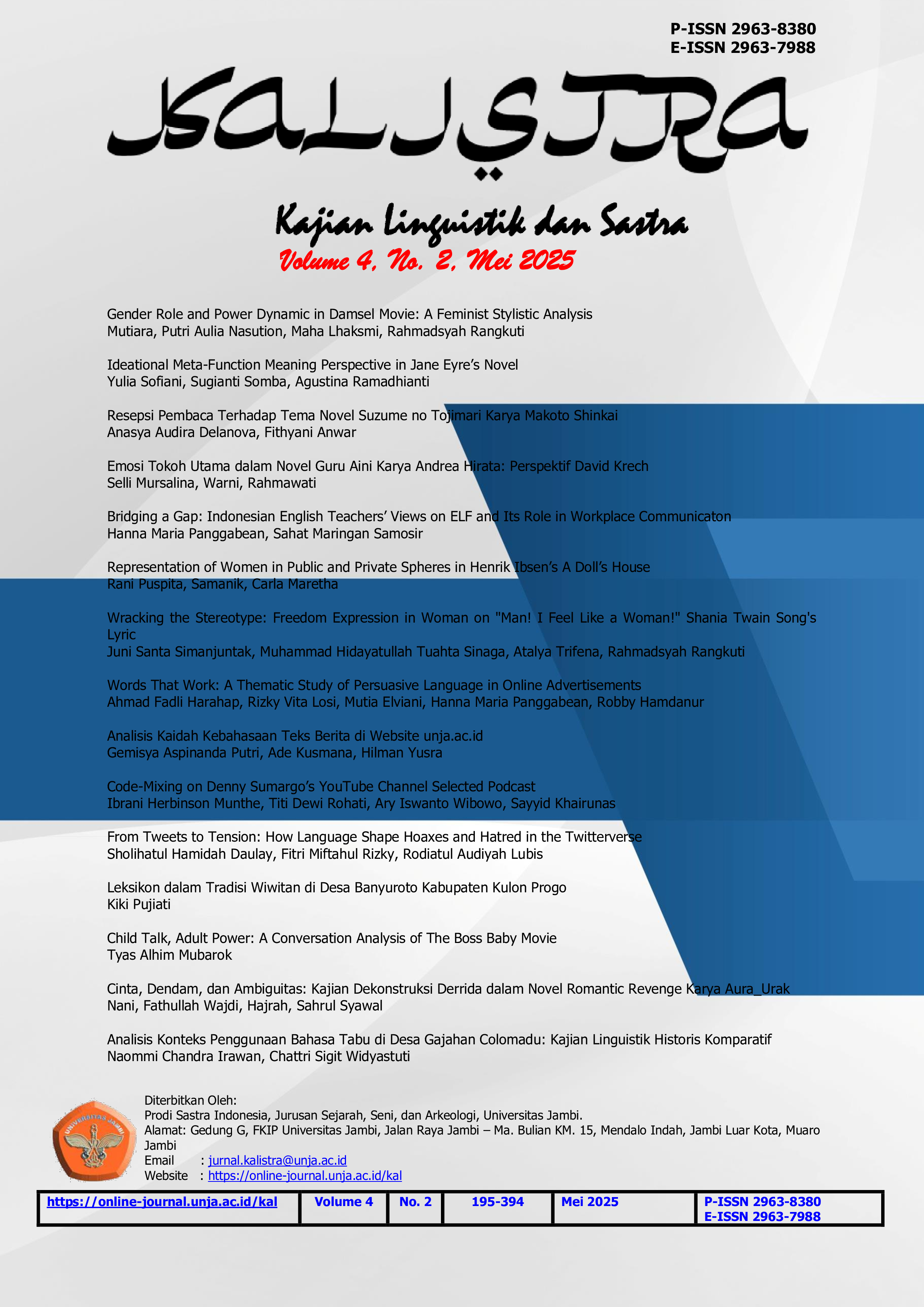Leksikon dalam Tradisi Wiwitan di Desa Banyuroto Kabupaten Kulon Progo
DOI:
https://doi.org/10.22437/kalistra.v4i2.40275Keywords:
tradisi, leksikon, makna kulturalAbstract
Wiwitan tradition is one of the traditions of the people in Banyuroto Village, Kulon Progo Regency, which is held before the harvest period begins. The wiwitan tradition is a form of gratitude from farmers for the harvest given by God. This research uses descriptive qualitative method. Data collection in this study used interview techniques. The results of the data obtained then analysed using a linguistic approach. The data obtained from the results of interviews with several informants stated that in the wiwitan tradition there are 15 lexicons related to the wiwitan tradition, both objects, processions and names of dishes. From the lexical and cultural meanings, it was found that the function of the lexicon in the wiwitan tradition is to connect to God, to connect to supernatural beings, and as a prayer and life guide for the people of Banyuroto Village, Kulon Progo Regency.
Downloads
References
Abdullah, Wakit. 2014. Etnolinguistik: Teori, Metode, dan Aplikasinya. Surakarta: Universitas Sebelas Maret.
Abdullah, Wakit. (2017). Kearifan lokal dalam bahasa dan budaya Jawa: Studi Kasus Masyrakat Nelayan di Pesisir Selatan Kebumen Jawa Tengah (Kajian Etnolinguistik). Surakarta: UNS Press
Agustina, Y., & Syaifudin, A. (2021). Makna Kultural pada Satuan Lingual Tradisi Sesajen Pasang Tarub dalam Pernikahan Jawa. Jurnal Sastra Indonesia.
Aulia & Mardikantoro. (2021). Satuan Lingual pada Tradisi Manten Tebu di Pabrik Gula Pangkah Kabupaten Tegal: Kajian Etnolinguistik. JURNAL SASTRA Indonesia, 10(2), 71-141. https://doi.org/10.15294/jsi.v10i2.43976
Badan Pengembangan dan Pembinaan Bahasa. (n.d.). Kamus Besar Bahasa Indonesia (KBBI). Retrieved November 14, 2024, from https://kbbi.web.id/
Chaer, Abdul. 2013. Pengantar semantik bahasa Indonesia. Jakarta: Rineka Cipta.
Chaer, Abdul. 2015. Morfologi Bahasa Indonesia (Pendekatan Proses). Jakarta: Rineka Cipta.
Elsa Nandita Sari, & Bagus Wahyu Setyawan. (2022). Makna Filosofis Tradisi Wiwit Panen Masyarakat Desa Murukan Kecamatan Mojoagung: Proses Pelaksanaan Tradisi Wiwit Panen dan Makna Filosofis Tradisi Wiwit Panen. Jurnal Budaya Nusantara, 5(3), 130–136. https://doi.org/10.36456/JBN.vol5.no3.5687
Fauzia, S., Abdullah, W., & Purnanto, D. (2022). Tradition of Sesaji Rewandaat Goa Kreo as local wisdom. Indonesian Journal of Applied Linguistics, 12(1), 247-257. doi:https://doi.org/10.17509/ijal.v12i1.46537
Hastuti., M., & Yuniawan, T. (2023). Satuan Lingual Batik Tulis Girilayu di Kabupaten Karanganyar. Jurnal Bima: Pusat Publikasi Ilmu Pendidikan bahasa dan Sastra. 1(2), 32-45). https://doi.org/10.61132/bima.v1i3.65
Janah, M., M.Pd., W., & Astuti, E. (2020). Istilah-Istilah dalam Tradisi Reresik Sendhang di Desa Wonosoco Kecamatan Undaan Kabupaten Kudus (Suatu Kajian Etnolinguistik). Sutasoma : Jurnal Sastra Jawa, 7(2), 1-7. https://doi.org/10.15294/sutasoma.v7i2.25800
Kramsch, C. (2011). Language and culture. Oxford University Press.
Kementerian Pendidikan, Kebudayaan, Riset, dan Teknologi Republik Indonesia. (n.d.). Kamus Besar Job Indonesia (KBJI). Retrieved November 14 2024, from https://kbji.kemdikbud.go.id/
Koentjaraningrat. (2005). Pengantar Antropologi Jilid II. Jakarta: PT.RINEKA CIPTA
Kridalaksana, Harimurti. 2009b. “Leksikon.” Pp. 138–42 in Pesona Bahasa: Langkah Awal Memahami Linguistik, edited by Kushartanti, U. Yuwono, and M. R. Lauder. Jakarta: Gramedia.
Mahendra., D. (2021). Leksikon Pertanian Tradisional Suku Sasak di Pulai Lombok: Kajian Etnolinguistik. Jurnal Penelitian Sejarah dan Budaya, 7(2). DOI: https://doi.org/10.36424/jpsb.v7i2.243
Mardikantoro, H. (2016). Satuan Lingual Pengungkap Kearifan Lokal Dalam Pelestarian Lingkungan. Bahasa dan Seni: Jurnal Bahasa, Sastra, Seni, dan Pengajarannya, 44(1). https://journal2.um.ac.id/index.php/jbs/article/view/204
Putri., K. (2018). Klasifikasi Satuan Lingual Leksikon Keramik Di Desa Sakok, Kelurahan Sedau, Kota Singkawang. Jurnal Pendidikan dan Pembelajaran Khatulistiwa, 7(9).
Rehulina, R., Rokhman, F., & Mardikantoro, H. B. (2020). The Lingual Unit of Batak Simalungun Traditional Wedding Ceremony in The Medan of Etnolinguistic Study. Seloka: Jurnal Pendidikan Bahasa Dan Sastra Indonesia, 9(1), 18-27. https://doi.org/10.15294/seloka.v9i1.35925
Rudiyanto., Rais, A. R., & Purnanto., D. (2020). Tinjauan Etnolinguistik: Makna Kultural dalam Tradisi “SRANAN” sebagai Wujud Kearifan Lokal Masyarakat Petani Pegunungan di Kebumen. Prodising Seminar Nasional Linguistik dan Sastra (SEMANTIKS) 2020.
Saputra, R. (2016, August 18). Wiwitan, upacara panen padi di Yogyakarta yang nyaris punah. Detik.com. Retrieved November 14, 2024, from https://news.detik.com/berita/d-3439560/wiwitan-upacara-panen-padi-di-yogyakarta-yang-nyaris-punah
Sastra.org. (n.d). Leksikon. Retrieved November 14, 2024, from https://www.sastra.org/leksikon.
Septiana, D. (2019). Leksikon Pertanian Pada Masyarakat Dayak
Maanyan. Suar Betang, 13(2), 217-227 doi:https://doi.org/10.26499/surbet.v13i2.74
Suwandi, S. (2017). Semantik: Pengantar kajian makna (M. Rohmadi, Ed.). Yogyakarta: Media Perkasa.
Wildani, D. (2023). An Ethnolinguistic Study on the Lexicon in Haul Bungah Tradition. SUAR BETANG, 18(2), 249-264. doi:https://doi.org/10.26499/surbet.v18i2.14544
Yulianti, A. (2018). Leksikon Dalam Upacara Kematian (Tiwah) Suku Dayak
Downloads
Published
How to Cite
Issue
Section
License
Copyright (c) 2025 Kiki Pujianti

This work is licensed under a Creative Commons Attribution-ShareAlike 4.0 International License.
Kalistra: Kajian Linguistik dan Sastra is licensed under Creative Commons Attribution-ShareAlike 4.0 International License.
Authors who publish their manuscripts in Kajian Linguistik dan Sastra agree to the following terms:
1. The copyright in each article belongs to the author.
2. The author acknowledges that Kajian Linguistik dan Sastra reserves the right to be the first to publish under a Creative Commons Attribution-ShareAlike 4.0 International License (Attribution 4.0 International CC BY-SA 4.0).
3. Authors may submit articles separately, arranging for non-exclusive distribution of manuscripts that have been published in this journal to other versions (e.g., delivery to the author's institutional repository, publication into a book, etc.), acknowledging that the manuscript has been first published in Kajian Linguistik dan Sastra.
















